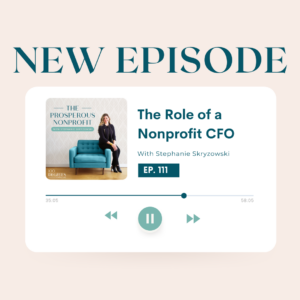
Running a nonprofit can be rewarding but also challenging, especially for leaders juggling various tasks. Success hinges on a strong financial foundation, with the Chief Financial Officer (CFO) playing a critical role. In this post, we explore the nonprofit CFO’s role and offer key hiring questions to ensure the best candidate selection.
The Role of a Nonprofit Chief Financial Officer
When I first began my career as a nonprofit CFO, I vividly remember an interview with the board’s treasurer. They were also the retired CFO of a massive global corporation. I was in my late 20s, incredibly nervous, and still relatively new to the world of nonprofit finance. Despite my anxiety, the treasurer shared a piece of advice that has stuck with me throughout my entire career. Their advice? The role of the CFO is to see around the corner.
This simple yet powerful statement set my career on a trajectory that has led me to where I am today. It’s a perspective I carry with me in every aspect of my work as a CFO.
Seeing Around the Corner: Key Responsibilities of a Nonprofit CFO
- Scenario Planning and Financial Forecasting: A CFO should be able to think through various scenarios that may impact your organization and financially plan for them. This involves forecasting and making projections based on different circumstances, ultimately guiding the decision-making process.
- Engaging with Stakeholders: As the hub of the organization, the CFO should be able to bring together different teams, such as development, leadership, and program teams, to discuss financial matters.
- Identifying Patterns and Trends: A CFO should be skilled in using data, KPIs, and analytics to identify potential risks or future opportunities, helping the organization make informed decisions.
Hiring a Nonprofit CFO: Essential Questions to Ask
When searching for the ideal CFO candidate, it’s crucial to ask the right questions and listen for stories that showcase their experience, expertise, and passion for nonprofit work. A candidate who can share stories demonstrating their ability to navigate complex financial situations, collaborate with various stakeholders, and effectively communicate financial information will likely be a strong fit for your organization.
During the interview process, encourage candidates to share stories that illustrate their past experiences in the following areas:
- Experience in Financial Management: Ask the candidate to share a story about a time when they faced a challenging financial situation and how they navigated it.
- Nonprofit Experience: Request examples of how the candidate has made a significant impact within a nonprofit organization through their financial expertise.
- Financial Planning and Budgeting Approach: Have the candidate explain their approach to budgeting and how they have successfully collaborated with different departments in previous roles.
- Risk Management Strategies: Invite the candidate to discuss a situation where they identified and mitigated a potential financial risk for a nonprofit organization.
- Communication Style: Encourage the candidate to provide an example of how they effectively communicated complex financial information to various stakeholders.
By understanding the role of a nonprofit CFO and asking the right questions during the hiring process. Then, you can ensure that you’re bringing on a CFO who will help your nonprofit thrive. A strong CFO is not just a financial expert. They’re an essential partner in your organization’s journey toward achieving its mission and making a lasting impact.
Read the podcast transcripts here.
Links mentioned in this episode:
- Connect with Stephanie on Instagram
- Connect with 100 Degrees Consulting on Instagram
- Understand (and maximize) your organization’s numbers with this free download.
Want more of the podcast?
- New episodes are released weekly! Find them all plus show notes and exclusive bonus content at 100degreesconsulting.com/podcast
- Leave us a review! Click here, scroll to the bottom, tap to rate with five stars, and select “Write a Review.” Let me know what you loved most about this episode!
- Subscribe to the show so you don’t miss a thing





















